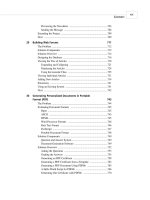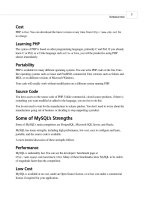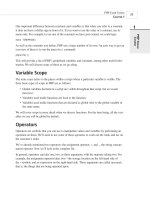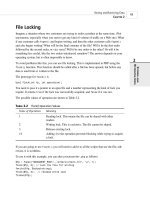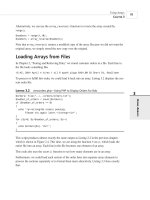Phát triển web với PHP và MySQL - p 1 pps
Bạn đang xem bản rút gọn của tài liệu. Xem và tải ngay bản đầy đủ của tài liệu tại đây (328.88 KB, 10 trang )
Luke Welling and Laura Thomson
201 West 103rd St., Indianapolis, Indiana, 46290 USA
PHP and MySQL
Web Development
00 7842 FM 3/6/01 3:38 PM Page i
PHP and MySQL Web Development
Copyright © 2001 by Sams Publishing
All rights reserved. No part of this book shall be reproduced, stored in a
retrieval system, or transmitted by any means, electronic, mechanical, photo-
copying, recording, or otherwise, without written permission from the pub-
lisher. No patent liability is assumed with respect to the use of the information
contained herein. Although every precaution has been taken in the preparation
of this book, the publisher and author assume no responsibility for errors or
omissions. Neither is any liability assumed for damages resulting from the use
of the information contained herein.
International Standard Book Number: 0-672-31784-2
Library of Congress Catalog Card Number: 99-64841
Printed in the United States of America
First Printing: March 2001
04 03 02 01 4 3 2 1
Trademarks
All terms mentioned in this book that are known to be trademarks or service
marks have been appropriately capitalized. Sams Publishing cannot attest to
the accuracy of this information. Use of a term in this book should not be
regarded as affecting the validity of any trademark or service mark.
Warning and Disclaimer
Every effort has been made to make this book as complete and as accurate as
possible, but no warranty or fitness is implied. The information provided is on
an “as is” basis. The authors and the publisher shall have neither liability nor
responsibility to any person or entity with respect to any loss or damages aris-
ing from the information contained in this book or from the use of the CD-
ROM or programs accompanying it.
ACQUISITIONS EDITOR
Shelley Johnston Markanday
DEVELOPMENT EDITOR
Scott D. Meyers
MANAGING EDITOR
Charlotte Clapp
COPY EDITOR
Rhonda Tinch-Mize
INDEXER
Kelly Castell
PROOFREADERS
Kathy Bidwell
Tony Reitz
TECHNICAL EDITORS
Israel Denis
Chris Newman
TEAM COORDINATOR
Amy Patton
SOFTWARE DEVELOPMENT
SPECIALIST
Dan Scherf
INTERIOR DESIGN
Anne Jones
COVER DESIGN
Anne Jones
PRODUCTION
Ayanna Lacey
Heather Hiatt Miller
Stacey Richwine-DeRome
00 7842 FM 3/6/01 3:38 PM Page ii
Overview
Introduction 1
P
ART I Using PHP
1 PHP Crash Course 9
2 Storing and Retrieving Data 49
3 Using Arrays 69
4 String Manipulation and Regular Expressions 93
5 Reusing Code and Writing Functions 117
6 Object-Oriented PHP 147
P
ART II Using MySQL
7 Designing Your Web Database 171
8 Creating Your Web Database 183
9 Working with Your MySQL Database 207
10 Accessing Your MySQL Database from the Web with PHP 227
11 Advanced MySQL 245
P
ART III E-commerce and Security
12 Running an E-commerce Site 267
13 E-commerce Security Issues 281
14 Implementing Authentication with PHP and MySQL 303
15 Implementing Secure Transactions with PHP and MySQL 327
P
ART IV Advanced PHP Techniques
16 Interacting with the File System and the Server 351
17 Using Network and Protocol Functions 369
18 Managing the Date and Time 391
19 Generating Images 401
20 Using Session Control in PHP 429
21 Other Useful Features 447
00 7842 FM 3/6/01 3:38 PM Page iii
PART V Building Practical PHP and MySQL Projects
22 Using PHP and MySQL for Large Projects 459
23 Debugging 477
24 Building User Authentication and Personalization 497
25 Building a Shopping Cart 539
26 Building a Content Management System 587
27 Building a Web-Based Email Service 617
28 Building a Mailing List Manager 655
29 Building Web Forums 711
30 Generating Personalized Documents in Portable Document Format (PDF) 743
P
ART VI
A Installing PHP 4 and MySQL 781
B Web Resources 803
Index 807
00 7842 FM 3/6/01 3:38 PM Page iv
Contents
Introduction 1
Who Should Read This Book? 1
What Is PHP? 1
What Is MySQL? 2
Why Use PHP and MySQL? 2
Some of PHP’s Strengths 3
Performance 3
Database Integration 3
Built-In Libraries 4
Cost 4
Learning PHP 4
Portability 4
Source Code 4
Some of MySQL’s Strengths 4
Performance 5
Low Cost 5
Ease of Use 5
Portability 5
Source Code 5
How Is This Book Organized? 5
What’s New in PHP Version 4? 6
Finally 6
PART I Using PHP 7
1 PHP Crash Course 9
Using PHP 11
Sample Application: Bob’s Auto Parts 11
The Order Form 11
Processing the Form 13
Embedding PHP in HTML 13
Using PHP Tags 14
PHP Tag Styles 15
PHP Statements 15
Whitespace 16
Comments 16
Adding Dynamic Content 17
Calling Functions 18
The date() Function 18
00 7842 FM 3/6/01 3:38 PM Page v
PHP AND MYSQL WEB DEVELOPMENT
vi
Accessing Form Variables 19
Form Variables 19
String Concatenation 20
Variables and Literals 21
Identifiers 21
User-Declared Variables 22
Assigning Values to Variables 22
Variable Types 22
PHP’s Data Types 22
Type Strength 23
Type Casting 23
Variable Variables 23
Constants 24
Variable Scope 25
Operators 25
Arithmetic Operators 26
String Operators 27
Assignment Operators 27
Comparison Operators 29
Logical Operators 30
Bitwise Operators 31
Other Operators 32
Using Operators: Working Out the Form Totals 33
Precedence and Associativity: Evaluating Expressions 34
Variable Functions 36
Testing and Setting Variable Types 36
Testing Variable Status 37
Reinterpreting Variables 37
Control Structures 38
Making Decisions with Conditionals 38
if Statements 38
Code Blocks 38
A Side Note: Indenting Your Code 39
else Statements 39
elseif Statements 40
switch Statements 41
Comparing the Different Conditionals 42
Iteration: Repeating Actions 43
while Loops 44
for Loops 45
do while Loops 46
00 7842 FM 3/6/01 3:38 PM Page vi
CONTENTS
vii
Breaking Out of a Control Structure or Script 47
Next: Saving the Customer’s Order 47
2 Storing and Retrieving Data 49
Saving Data for Later 50
Storing and Retrieving Bob’s Orders 50
Overview of File Processing 52
Opening a File 52
File Modes 52
Using fopen() to Open a File 53
Opening Files for FTP or HTTP 54
Problems Opening Files 55
Writing to a File 57
Parameters for fwrite() 57
File Formats 58
Closing a File 58
Reading from a File 59
Opening a File for Reading: fopen() 60
Knowing When to Stop: feof() 60
Reading a Line at a Time: fgets(), fgetss(), and fgetcsv() 60
Reading the Whole File: readfile(), fpassthru(), file() 61
Reading a Character: fgetc() 62
Reading an Arbitrary Length: fread() 63
Other Useful File Functions 63
Checking Whether a File Is There: file_exists() 63
Knowing How Big a File Is: filesize() 63
Deleting a File: unlink() 63
Navigating Inside a File: rewind(), fseek(), and ftell() 64
File Locking 65
Doing It a Better Way: Database Management Systems 66
Problems with Using Flat Files 66
How RDBMSs Solve These Problems 67
Further Reading 67
Next 67
3 Using Arrays 69
What Is an Array? 70
Numerically Indexed Arrays 71
Initializing Numerically Indexed Arrays 71
Accessing Array Contents 72
Using Loops to Access the Array 73
00 7842 FM 3/6/01 3:38 PM Page vii
PHP AND MYSQL WEB DEVELOPMENT
viii
Associative Arrays 73
Initializing an Associative Array 73
Accessing the Array Elements 73
Using Loops with each() and list() 74
Multidimensional Arrays 75
Sorting Arrays 79
Using sort() 79
Using asort() and ksort() to Sort Associative Arrays 79
Sorting in Reverse 80
Sorting Multidimensional Arrays 80
User Defined Sorts 80
Reverse User Sorts 82
Reordering Arrays 83
Using shuffle() 83
Using array_reverse() 84
Loading Arrays from Files 85
Other Array Manipulations 88
Navigating Within an Array: each, current(), reset(),
end(), next(), pos(), and prev() 88
Applying Any Function to Each Element in an Array:
array_walk() 89
Counting Elements in an Array: count(), sizeof(), and
array_count_values() 90
Converting Arrays to Scalar Variables: extract() 91
Further Reading 92
Next 92
4 String Manipulation and Regular Expressions 93
Example Application: Smart Form Mail 94
Formatting Strings 96
Trimming Strings: chop(), ltrim(), and trim() 96
Formatting Strings for Presentation 97
Formatting Strings for Storage: AddSlashes() and StripSlashes() 100
Joining and Splitting Strings with String Functions 101
Using explode(), implode(), and join() 102
Using strtok() 102
Using substr() 103
Comparing Strings 104
String Ordering: strcmp(),strcasecmp(), and strnatcmp() 104
Testing String Length with strlen() 105
Matching and Replacing Substrings with String Functions 105
Finding Strings in Strings: strstr(), strchr(), strrchr(), stristr() 106
Finding the Position of a Substring: strpos(), strrpos() 107
Replacing Substrings: str_replace(), substr_replace() 108
00 7842 FM 3/6/01 3:38 PM Page viii
CONTENTS
ix
Introduction to Regular Expressions 109
The Basics 109
Character Sets and Classes 110
Repetition 111
Subexpressions 111
Counted Subexpressions 112
Anchoring to the Beginning or End of a String 112
Branching 112
Matching Literal Special Characters 112
Summary of Special Characters 113
Putting It All Together for the Smart Form 113
Finding Substrings with Regular Expressions 114
Replacing Substrings with Regular Expressions 115
Splitting Strings with Regular Expressions 115
Comparison of String Functions and Regular Expression
Functions 116
Further Reading 116
Next 116
5 Reusing Code and Writing Functions 117
Why Reuse Code? 118
Cost 118
Reliability 119
Consistency 119
Using require() and include() 119
Using require() 119
File Name Extensions and Require() 120
PHP Tags and require() 121
Using require() for Web Site Templates 121
Using auto_prepend_file and auto_append_file 126
Using include() 127
Using Functions in PHP 129
Calling Functions 129
Call to Undefined Function 131
Case and Function Names 132
Why Should You Define Your Own Functions? 132
Basic Function Structure 132
Naming Your Function 133
Parameters 134
Scope 136
Pass by Reference Versus Pass by Value 138
Returning from Functions 140
00 7842 FM 3/6/01 3:38 PM Page ix
PHP AND MYSQL WEB DEVELOPMENT
x
Returning Values from Functions 141
Code Blocks 142
Recursion 143
Further Reading 145
Next 145
6 Object-Oriented PHP 147
Object-Oriented Concepts 148
Classes and Objects 148
Polymorphism 149
Inheritance 150
Creating Classes, Attributes, Operations in PHP 150
Structure of a Class 151
Constructors 151
Instantiation 152
Using Class Attributes 152
Calling Class Operations 154
Implementing Inheritance in PHP 155
Overriding 156
Multiple Inheritance 157
Designing Classes 158
Writing the Code for Your Class 159
Next 168
PART II Using MySQL 169
7 Designing Your Web Database 171
Relational Database Concepts 172
Tables 173
Columns 173
Rows 173
Values 173
Keys 173
Schemas 175
Relationships 175
How to Design Your Web Database 176
Think About the Real World Objects You Are Modeling 176
Avoid Storing Redundant Data 176
Use Atomic Column Values 178
Choose Sensible Keys 179
Think About the Questions You Want to Ask the Database 179
Avoid Designs with Many Empty Attributes 179
Summary of Table Types 180
00 7842 FM 3/6/01 3:38 PM Page x


